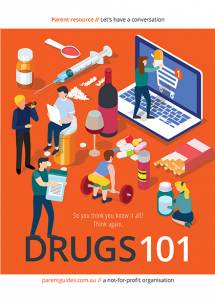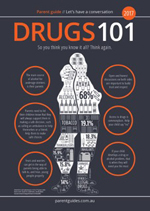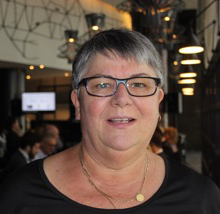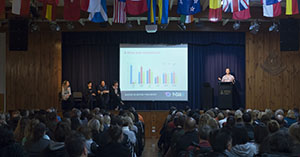ABC Radio Melbourne morning presenter Jon Faine accepted an invitation from a listener to sit down have a cup of tea and talk about what’s happened in his family. “Tony”, as he asked to be called, wanted his story to be heard by a wider audience.
JF: Let’s start at the beginning. Tell us, what happened?
Tony: I guess the best place to start would be, nearly on three years ago now my wife and I received two distressing calls from two of our oldest sons.
JF: You have how many children altogether?
Tony:Four. We’ve lived in our community for over thirty years. Like all parents we’ve always wanted to do the right things and we’re very connected in the community. A loving family, grandparents who adored the grandchildren but on this particular day we received two distressing calls separately. One to me and one to my wife. It was basically screaming coming over the phone. There was the mention of “He’s going to shoot me”. I grabbed my wife, we jumped in the car and we went to this place, which happened to be my parents house, about 10 minutes away. We got there and as we were rounding the corner there was over 30 police cars, there were helicopters. It was like a scene out of some sort of movie. There were the tapes they put across the road. Well, I disregarded the tapes and drove through them and I could see my younger of my two older boys lying on the ground.
JF: He’s how old?
Tony: At the time he was approximately 25. As with anything like that of course what you’re hoping for is to see some kind of movement. He was just lying there so we had no idea whether he was dead, alive or whatever.
JF: Were there police nearby?
Tony: There were over two-dozen police …
JF: No, no. Nearby him specifically? On the ground.

Tony: Oh yeah, there were police literally covering the whole street. Literally, it was a scene out of some sort of movie. I saw a movement in him, which sounds stupid, but it was kind of a relief. At least he was alive but we still had no indication of what condition he was in.
JF: Were the police attending to him at the time?
Tony: Ahh, the police were standing around. At that point there was no ambulance. At that point I jumped out of the car, the police tried to stop me from going to him but I decided that I would do so anyway. My wife was really distressed of course, that kind of thing.
JF: Your other son?
Tony: My other son, there was no sign of him, but the police that were in the area were standing outside the gate of this particular home and they had their guns drawn. So of course we were fearing the worst. I guess I summed up the situation by recognising he had, umm, he had fired the gun and …
JF: So one of your sons had shot one of your other sons, and all of this is because …?
Tony: They had an altercation. Both of them had been for some time using ice and we had tried virtually everything. We had plenty of times we’d had the CAT team around, we’d had police officers around, we’d had smashed up rooms, smashed up house. We had tried everything in our power. We’d been in rehabilitation places, all sorts of things that had gone on. None of which really addressed the issue with regard to it and there is plenty I can say about that particular thing.
JF: So a prosperous family, thoroughly Melbourne middle class, find their world turned upside down because of this particular substance and the grip its got on your two eldest children.
Tony: That’s right. These young men had not had any bad upbringing or anything else like that. I don’t’ think we’re terribly bad parents. I think we’re average parents. We had always given them the opportunity to speak freely with us and communicate with us.
JF: Good educations and all the rest of it. Tony, let’s avoid some of the issues here but not avoid others. One of your sons is now in jail and one is not. The one in jail is no longer using, the one who’s out may still be using.
Tony: Possibly, possibly still.
JF: And your frustration. The issues to do with ice use take up in your community have been discussed now for years but your specific frustration is directed at what part of what’s going on?
Tony: I think its important to say too Jon that I’m not saying that what the authorities are doing is wrong. I’m not saying they’re being bad or wrong or otherwise, what I’m saying is that the current way we deal with this doesn’t work. It just doesn’t work. A quick example about that is that if you have a young person as we did who is going through what psychiatrists describe – I’m not a psychiatrist – describe as a psychotic episode that is drug induced, you don’t have a person who you can reason with.
As a parent, you are terrified, number one, of what the consequences may be. If you push them too far they may go outside the house and cause problems both to themselves, harm to themselves or others. If you call the police, and our young men and women of the police force, people who are like us have fear, have concern and if they turn up and somebody is highly agitated, they do have to defend themselves.
So the fear for us is, they might get shot. They might get hurt. All sort of things and it happens that in the kind of work that I do too I come into contact with thousands of parents. Hundreds of parents in may case, but I know of thousands of parents who are in the same situation sitting on their hands too scared to call the authorities because they don’t know what the outcome could be. Our CAT team, who are very, very effective people cannot attend if there is agitation.

JF: … or the threat of violence.
Tony: Or the threat of violence. Which is totally understandable. If you call up a rehabilitation place like a Melbourne clinic or a something like that that you have a referral for, like a psychiatrist. They won’t allow the person in until they interview them. So you’re expecting a person who’s going through a psychotic episode to make a phone call to sit calmly over the phone to answer a whole bunch of questions and then to be told “Well, we’ll let you know when we’ve got a room”.
JF: Which could be …?
Tony: Whenever. We’ve waited weeks, months, all sorts of things. In our particular case, you know we’ve had 10 years effectively since the beginning of all this kind of substance abuse, which has also brought on a lot of mental illness. With regard to that, we have visited many, many rehabilitation centers, many hospitals.
JF: … tried everything.
Tony: Tried everything. In speaking with different psychiatrists and things like that I guess is where I realised that we need a better way to look at this. It doesn’t currently work. I’ve sent letters; actually Mr Ken Lay was extremely helpful.
JF: Former Police commissioner.
Tony: That’s right. He was very sympathetic to the situation and was kind enough to put me in touch with a lot of the Ministers and I sent them letters. Unfortunately, and again, what I received back were letters telling me how much money had been spent but not really addressing the problem. What I do know Jon, and this is not just my opinion, what I do know from the kind of work that I do and that parents that I come into contact with who send me their teens and tweens sometimes. There are literally thousands of families around the country sitting on their hands living in hope that something good will come out of it somehow their child will stop using, too scared to call anybody for varying reasons.
The first one being shame, the second one being what if my child gets hurt, arrested, killed or otherwise. So there are no avenues and again, I’d like to really say that I’m not saying that our government is wrong or the authorities are wrong or anything like that but it just doesn’t work and we need to address it.
JF: So if you could tailor a service or whatever it is that you say is needed, what would it look like?
Tony: I’ve discussed this with a wonderful psychiatrist. I can’t name them, that would identify me, I guess. I discussed this at length and there is a way that we could have it be unlike what is current now where you might have somebody who’s kind-of trained in talking somebody down but a very, very able medical practitioner in the area of mental illness who would come with the police.
JF: … who may not be a doctor. Who may be a nurse.
Tony: But somebody who is very good …
JF: … very experienced.
Tony: Yeah. Experienced in saying to the police, officers for example, “It’s ok, it’s just a curtain rod, there’s no need to pull your guns out, let me talk to them”. That kind of thing. Then for that person, for that young man or woman to be taken and to be put into a facility – whether it’s against their will or not – but not necessarily to be charged. Not necessarily to have a blot against their name or anything else like that.
JF: So at the moment, it’s either police if there is violence and they’re not trained to do this, or it’s either a CAT team if there isn’t violence and yet you’ve got people who’re sort of in between who are not super aggressive or violent they’re more hurting themselves as much as anything. But you want a multi-disciplinary approach is what you’re calling for.
Tony: That’s right. I don’t want our police individuals to be harmed or otherwise.
JF: No, and paramedics can’t do this sort of work. CAT teams can’t do this sort of work.
Tony: No they can’t. I have on many occasions, but on one particular occasion I stood between the police and my son whilst he was going through a psychotic episode for over two and half hours.
JF: You physically put yourself between them?
Tony: I physically stood in between them and kept showing the police officers texts from my son, a letter he had written to his mother on Mother’s Day. This is a few years ago now, showing them what kind of person he truly is and what they’re seeing currently is not who he is. This is a young man who’s having a psychotic episode who can’t understand what’s going on. All he sees is a threat, the way a person see a threat when they’re having a massive panic attack. You know? And I stood in between them. I begged them. I pleaded with them. I explained things, I guess I was fortunate that he wasn’t shot or killed. He was sprayed with mace of which I, I think its called mace, or pepper spray, call it what you will. I was also sprayed with it accidentally. So I had the experience of what that feels like.

Download Now
They’re too scared to call somebody for help because there are no avenues where this can actually result in something good. It’s going end in tears and ultimately what ends up – and visiting my son in jail – all I’m seeing is young men, who are jailed, and they are our future. It’s quite extraordinary. Without having the first-hand experience, if you had told me this I would have thought “really”? “Is it really that bad?” It’s actually worse than I thought.
JF: Of your two sons, one is now in prison.
Tony: Uhh huh.
JF: How’s he going?
Tony: He’s actually remarkable I must say. He is remarkable.
JF: It’s not as if there aren’t drugs in jail, so how is he responding to that environment?
Tony: He has told us about that. How drugs are in jail. He has absolutely stayed away from it. He is working every day in jail he exercises every day. He is reading, he is writing, Originally my son was diagnosed with a particular condition and he was also diagnosed … sorry … assessed as somebody with an IQ in excess of 150. That brain is returning. So what we’ve got is a young man who calls us at least twice a day from the prison. We visit him twice a week. We get nothing except concern from him. He’s apologised so many times to us for what he’s put us through.
JF: So prison is actually helping him?
Tony: Prison is …
JF: It doesn’t help … it doesn’t help a lot of people, but here’s an example of one that it seem that might even be responding.
Tony: Well, it’s helped. I think why it’s helped is we’ve had the fortunate ability to firstly get him represented properly as in from the legal side of things. That’s been you know, a big financial burden with regard to that. But the other reason is the extraordinary support he receives from both us and his broader family. Now a lot of these young men don’t have that kind of support and I can guarantee you, and my son has told me time and time and time again, of how many people have been released and within a couple of months are back.
JF: One of the things we’ve learned Tony is that, organisations have sprung up, sometimes grassroots organisations, have sprung up to deal with issues within the community and the origins of for instance, Beyond Blue, are in exactly that, parents seeking peer support and finding a great champion which was former Premier Jeff Kennet who elevated the organisation. And there has been example after example. Where do parents go where did you go to learn how the system works? How did you find out all the things you’ve found out?
Tony: We’ve found out everything basically through personal trial and error.
JF: The hard way.
Tony: The hard way. What you quickly come to grips with, like I’m sure any parent out there who’s listening to this might be in a similar situation where they’re concerned about their child, sitting in their room currently. Maybe they haven’t slept for two or three days and is acting quite irrationally and the parent is terrified of saying anything to them so they stay out of their way. They call up somewhere, for example, Melbourne Clinic, which is a fantastic facility …
JF: Private centre. Fee charging. Not on the public purse.
Tony: … brilliant doctors. Right, fee charging. We are privately health covered, as a result of that we’re fortunate. If you are in the public system, you don’t have many options. There’s a couple of hospitals that may have those kinds of wards but again, to get into them is impossible based on waiting lists and based on the kind of referral. So the person has to literally be just about to either do harm to themselves or someone else in order to be fast tracked. Now that would also need to involve police and, of course, the danger both to the individual and to the police. So it’s kind of like you’re in between a rock and a hard place. That’s really where it’s at and I’m not just saying that to, you know, sensationalise the whole thing. It’s not about that.
My wife and I have some sophistication, we have some ability. We’re very known in our community, you know, we know how to talk to people we know how to get through the processes and we couldn’t do it. We couldn’t do it. So there are parents out there languishing and the only way we’re going to get past all this kind of thing is to recognise that the current way we do it doesn’t work and that there’s got to be a better way. One of those ways is to set it up, to use some of that money that’s been funded that the government keeps telling us they’re funding, into something that is actually workable. That actually looks at these young people as our future and not as somebody who’s just being an idiot.
JF: …or to be thrown on the scrap heap.
Tony: Yeah and Jon, forgive me but when my son was being treated in hospital a very very senior surgeon came up to me and he said, “was it ice?”. And I said, “yes it was”. And this is a surgeon who is very well to do, all that kind of stuff, obviously very intelligent, who sees this on a daily basis. He says to me, actually put his arm around me, and says to me, “I have four wonderful children. Three of whom are wonderful but my eldest is expletive on ice and there is nothing I can do.”
The arresting detective of my son said to me his eldest is also in the same boat. Sitting in court, in the magistrate’s court, on countless times now for both boys. We recognise certain magistrates have the same issue with their children. So, this is not something that we can say only lives out in the western suburbs or any other suburb, this is across the board. And we don’t actually recognise the extent of it, really. Like really. And I remember you telling me the story about your own friends.
JF: Let’s leave that alone. Tony. Not your real name. It takes a lot of guts to speak publicly about what’s going on in your own family in such searingly honest ways. … Let’s keep in touch and see what eventuates from it. Different people are making different suggestions. If something does come from this even if it’s just a support organisation or an organisation that lobbies for reform, that in itself would be significant but certainly thank you for getting in touch it’s been a very steep learning curve for many of us.
Tony: Jon thank you very much for the opportunity and I guess really why I’m here is to let people out there know that people are going through this. They might be your neighbour. You’re not alone and there’s got to be a better way. And again, that it’s not like anybody’s doing anything wrong, those trying to fix this, but it’s about that it doesn’t work and we need to look at it in a different way. Thanks again.



